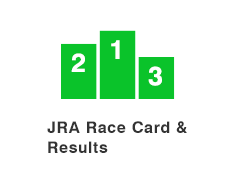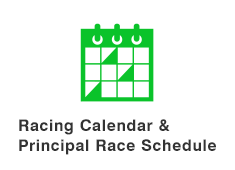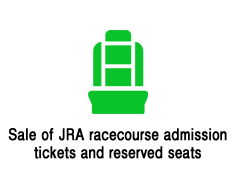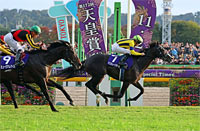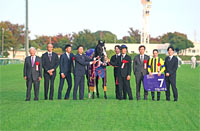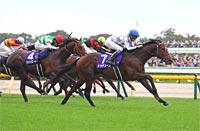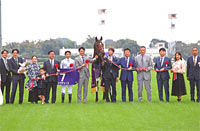Tenno Sho (Autumn) (G1) - Data Analysis
Middle-distance champion decider with lineup of stellar performers
Equinox, who successively won the Tenno Sho (Autumn) in 2022 and 2023, was voted JRA’s Horse of the Year in both years. In addition, 2021 winner Efforia and 2020 winner Almond Eye were awarded the same title in the year of their victory. Let’s now analyze some features shared by successful runners in this race based on results over the last 10 years.
Zero Top 3 finishes by runners aged 6 and above
The 30 Top 3 finishers in the last 10 years were all aged 5 or below. The last horse aged 6 or above to finish in the Top 3 was third-place finisher Eishin Flash in 2013. In other words, we should lower our expectations of horses aged 6 and above. [Table 1]
[Table 1] Performance by age (last 10 years)
| Age |
Performance
[1st-2nd-3rd-4th or lower] |
Win ratio |
Top 2 ratio |
Top 3 ratio |
| 5 or below |
10-10-10-74 |
9.6% |
19.2% |
28.8% |
| 6 or above |
0-0-0-47 |
0% |
0% |
0% |
Focus on runners that performed strongly last time out
Of the 30 Top 3 finishers in the last 10 years, 22 had finished in the Top 3 of their previous race. Conversely, runners that had finished 4th or lower struggled with a Top 3 ratio of 9.6 %. This trend was even more apparent if we limit our analysis to the six years since 2018, when the runners in this group delivered performance of [0-1-1-41] (Top 3 ratio of 4.7%). This suggests we should discount runners that have been beaten to 4th or lower in their previous race. [Table 2]
[Table 2] Performance by finish in the previous race (last 10 years)
| Finish in previous race |
Performance
[1st-2nd-3rd-4th or lower] |
Win ratio |
Top 2 ratio |
Top 3 ratio |
| 3rd or higher |
9-6-7-46 |
13.2% |
22.1% |
32.4% |
| 4th or lower |
1-4-3-75 |
1.2% |
6.0% |
9.6% |
Runners starting in the outer brackets have fared poorly in recent years
Of the 21 Top 3 finishers in the last seven years, 20 entered the race with the numbers 1-9. Meanwhile, among runners with the numbers 10-18, the only runner to finish in the Top 3 was third-place finisher Kiseki in 2018, who entered the race with the number 10. We can therefore conclude that runners starting in the outer brackets are at a disadvantage. [Table 3]
[Table 3] Performance by horse number (last seven years)
| Horse number |
Performance
[1st-2nd-3rd-4th or lower] |
Win ratio |
Top 2 ratio |
Top 3 ratio |
| 1-9 |
7-7-6-42 |
11.3% |
22.6% |
32.3% |
| 10-18 |
0-0-1-37 |
0% |
0% |
2.6% |
Runners that have performed well in a G1 race at Tokyo or Kyoto Racecourse enjoy success
Of the 18 Top 3 finishers in the last six years, 13 had experience of finishing in the Top 2 of a G1 race held at Tokyo or Kyoto Racecourse since the previous year. Conversely, runners without such experience struggled with a Top 3 ratio of 8.2%. Among this year’s runners, we should therefore raise our expectations considerably for those with a Top 2 finish in a G1 race held at Tokyo or Kyoto Racecourse since 2023. [Table 4]
[Table 4] Performance by experience of finishing in the Top 2 of a G1 race held at Tokyo or Kyoto Racecourse since the previous year (last six years)
| Experience |
Performance
[1st-2nd-3rd-4th or lower] |
Win ratio |
Top 2 ratio |
Top 3 ratio |
| Yes |
6-3-4-8 |
28.6% |
42.9% |
61.9% |
| No |
0-3-2-56 |
0% |
4.9% |
8.2% |
In addition, among the five runners that finished in the Top 3 without having finished in the Top 2 of a G1 race held at Tokyo or Kyoto Racecourse since the previous year, three had experience of finishing in the Top 2 of the same-year Sapporo Kinen. In other words, among runners without the aforementioned track record, we should raise our expectations of those that have finished in the Top 2 of the Sapporo Kinen, which is one of the major prep races for the Tenno Sho (Autumn). [Table 5]
[Table 5] Among runners without experience of finishing in the Top 2 of a G1 race held at Tokyo or Kyoto Racecourse since the previous year, performance by experience of finishing in the Top 2 of the same-year Sapporo Kinen (last six years)
| Experience |
Performance
[1st-2nd-3rd-4th or lower] |
Win ratio |
Top 2 ratio |
Top 3 ratio |
| Yes |
0-2-1-2 |
0% |
40.0% |
60.0% |
| No |
0-1-1-54 |
0% |
1.8% |
3.6% |
Interval since the previous race should not be overlooked
Of the 15 Top 3 finishers in the last five years, 14 entered the race eight weeks or more after their previous race. Meanwhile, runners that entered the race seven weeks or less after their previous race struggled with a Top 3 ratio of 3.1%. Up to 2018, many runners that entered the race seven weeks or less after their previous race turned in strong performance. However, if trends in recent years are anything to go by, we should lower our expectations of runners entering the race with a relatively short interval since their previous race. [Table 6]
[Table 6] Performance by interval since the previous race (last five years)
Interval since
previous race |
Performance
[1st-2nd-3rd-4th or lower] |
Win ratio |
Top 2 ratio |
Top 3 ratio |
| Seven weeks or less |
0-0-1-31 |
0% |
0% |
3.1% |
| Eight weeks or more |
5-5-4-24 |
13.2% |
26.3% |
36.8% |
Seek out the winner!
Kanto-trained horses have secured six consecutive victories
The last six winners all had a trainer affiliated with the Miho Training Center. Other shared features among these six winners were the fact that they were all aged 5 or below, that they had finished in the Top 3 of their previous race, that they entered the Tenno Sho (Autumn) with the numbers 2-9, and that they had experience of finishing in the Top 2 of a G1 race held at Tokyo Racecourse since the previous year. We should therefore narrow down win contenders by taking into consideration the trends shown in Tables 1, 2, 3 and 4. [Table 7]
[Table 7] Winners’ trainer (affiliation), age, finish in previous race, horse number in the Tenno Sho (Autumn), and highest finish in a G1 race held at Tokyo Racecourse since previous year (last six years)
| Year |
Winner |
Trainer (affiliation) |
Age |
Finish in previous race |
Horse number |
Highest finish in G1 race held
at Tokyo Racecourse since
previous year |
| 2018 |
Rey de Oro |
Kazuo Fujisawa (Miho) |
4 |
1st |
4 |
1st (2017, Tokyo Yushun
[Japanese Derby]) |
| 2019 |
Almond Eye |
Sakae Kunieda (Miho) |
4 |
3rd |
2 |
1st (2018, Japan Cup, etc.) |
| 2020 |
Almond Eye |
Sakae Kunieda (Miho) |
5 |
2nd |
9 |
1st (2020, Victoria Mile, etc.) |
| 2021 |
Efforia |
Yuichi Shikato (Miho) |
3 |
2nd |
5 |
2nd (2021, Tokyo Yushun
[Japanese Derby]) |
| 2022 |
Equinox |
Tetsuya Kimura (Miho) |
3 |
2nd |
7 |
2nd (2022, Tokyo Yushun
[Japanese Derby]) |
| 2023 |
Equinox |
Tetsuya Kimura (Miho) |
4 |
1st |
7 |
1st (2022, Tenno Sho [Autumn]) |
(Masaya Ibuki)
|






